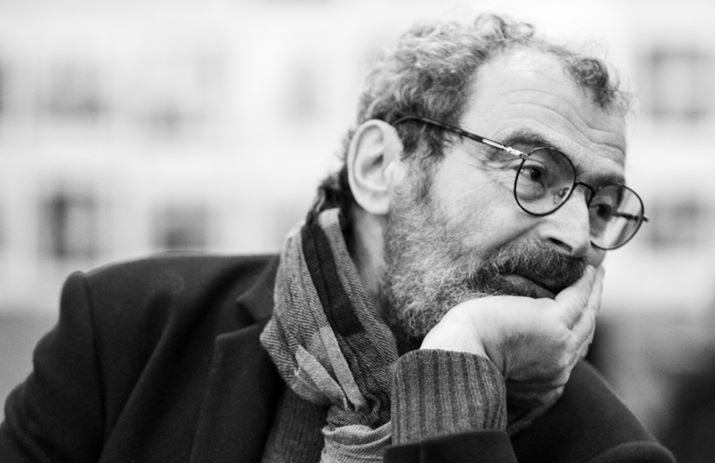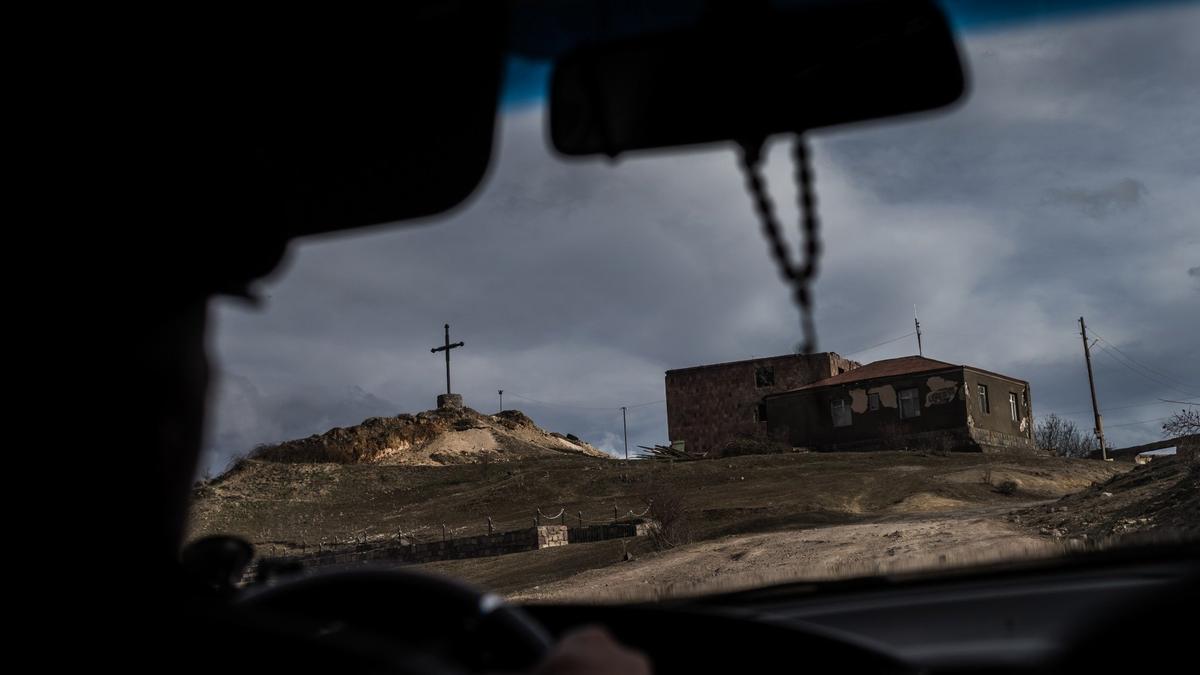Azerbaijan's army shelled the internationally recognised Armenian territory early 13 September. Baku claims that their aggression was “reaction to Armenia's large-scale sabotage”. Nikol Pashinyan, Armenia's PM, has already announced the death toll of 105 Armenian servicemen; the Azeri Defence Ministry estimates their losses at 50 soldiers.
What is happening now is the second escalation of the years-long Azeri-Armenian conflict in just two years; the difference is that now there is combat within the limits of internationally recognised Armenia borders and not the disputed Nagorno Karabakh region. We spoke to Arkady Dubnov, a political scientist and an expert on Central Asia and Southern Caucasus.

Arkady Dubnov. Photo: Facebook
What triggered the conflict this time?
There was no particular trigger really. Baku says the reason behind this full-scale armed intervention is that Armenia's sabouteurs attempted to mine locations within the disputed Nagorno-Karabakh region. This doesn't look convincing, and everyone understands that this was a contrived excuse. No Azeri officials have provided any evidence to substantiate the incursion.
Azerbaijan took both Yerevan and Moscow by surprise; I think they concluded that the current geopolitical situation would be a favourable opportunity for them. Baku, with Turkey's support, has decided to intensify the peace treaty negotiations right before the upcoming Shanghai Cooperation Organisation summit scheduled to start on Thursday in Uzbekistan's Samarkand. Countries like Armenia, Azerbaijan, Turkey, Iran, Belarus, Russia, and China will participate [it was revealed late 14 September that Armenia's PM Pashinyan would not arrive in Samarkand — Novaya.Europe].
Turkey's Erdoğan finds it extremely beneficial to help solve another years-long conflict, this time around between Baku and Yerevan. This is what he's planning to do, and this will slightly change the summit's agenda, of course.
Azerbaijan expects a meeting between Putin, [Azerbaijan's] Aliyev, Erdoğan, and Pashinyan to help them pressure Pashinyan into signing a peace treaty on Azerbaijan's terms. The Azerbaijani authorities believe that the treaty must favour their side since they won the 2020 Nagorno-Karabakh war. This is how things are done nowadays: all global problems are commonly solved using forcible methods, with ultimatums being presented beforehand. This is exactly what Russia did with Ukraine and the West. The ultimatum that the Kremlin presented to the West and Ukraine was used to rationalise the so-called “special military operation.” Warfare is used nowadays to decide things and, in a lot of ways, even to justify things.
Is what we are seeing now an escalation of the Nagorno-Karabakh conflict, or does Azerbaijan pursue other objectives?
Baku believes that the Nagorno-Karabakh problem is solved. There is no question about it for Aliyev, there is no way another Armenian state, even an unrecognised one, would exist in the South Caucasus. Each time Yerevan attempts to start a negotiation on the region's status, Baku says it's out of the question. The Nagorno-Karabakh area will now be an autonomous entity within Azerbaijan at the very best.
They demand more, however, namely a land connection [with its Nakhchivan exclave] through Armenia proper and further to Turkey and Europe.
So, what should we expect?
Responding with disproportionately using force to what they call “an Armenian provocation”, Baku has demonstrated that it's capable of a brutal response far beyond diplomacy. Two years after the victorious Nagorno-Karabakh war, Baku indicates that it is prepared to do it again or go even further.
On the one hand, it's hard to say what's going to happen if Baku doesn’t compel Yerevan to sign a peace treaty on their terms. On the other hand, it's hard to predict what Pashinyan is going to do. Reaching a domestic consensus to say yes to all Azerbaijan's terms will be challenging for him, even though Armenia's opposition can hardly confront him today.
So, the opposition is not strong enough to overthrow Pashiniyan or even keep him from making a trade-off with Azerbaijan.
What's Russia's role in this conflict and can its military base in Armenia's Gyumri make any difference?
Russia here is in passive voice, so to speak. It does not have any real influence on either side of the conflict, specifically Azerbaijan. Russia is Armenia's only ally within the CSTO, apart from Belarus. All other member states are loyal to Azerbaijan either due to their Islamic connections or ethnic ties. This became obvious during the 2020 war.
Therefore, Armenia should not expect any real support from the CSTO, even though they are the presiding country at the moment. The best thing they can expect is verbal support.
It was decided yesterday that the organisation's Secretary General Stanislav Zas of Belarus would visit the conflict area. It is expected that he would examine the current situation. And what happens then? So, you may consider this to be Russia's response. Yes, after Pashinyan called Putin, the latter called on Azerbaijan to stop military action. But it was too late as Azerbaijan had reached its goals by that moment, demonstrating that it is capable of using force wherever it finds necessary.
Moreover, the positions of Russia's peacekeepers in the region are somewhat uncertain. Russia cannot send more men to Nagorno-Karabakh as it needs soldiers in Ukraine. They cannot recall their men, either, as this may worsen the situation.
I may assume that there will be no Russian peacekeepers there in three years as Azerbaijan is very unlikely to extend their status. So, Russia may lose its influence in the South Caucasus completely.
As for their military base in Gyumri, I doubt that it would actually intervene. This didn't happen in 2020, and it's even more obvious that this won't happen now. The base was stationed in Armenia after the Soviet Union withdrew its troops from Afghanistan in 1989. It was set to be a Soviet outpost in the south where Turkey, a NATO member, is the big force.
As far as I'm concerned, this is its only function. It was used for some military drills back in the day, but that was more of a formality. In my judgement, not a single person in Armenia thinks this base would play any role in the standoff with Azerbaijan.
Pashinyan gave a call to Vladimir Putin, Joe Biden, and Emmanuel Macron yesterday. France then promised to convene a UN Security Council meeting to discuss the situation. Can the global community affect the situation in any way?
I'm sorry, I have quite a sick joke about this: it seems the only person Pashinyan failed to call is the Pope. He could have actually, as the Pope is currently in Kazakhstan. It's really like flogging a dead horse. This is not how such problems are solved. The only thing Armenia could gain here is verbal support in their fight against the aggressor. But the aggressor, mildly speaking, would not give a damn about this.
Those are just calls, and nothing more. You can compare this to the way the West supports Ukraine, calling on Russia to withdraw its troops and stop the “military operation.”
By the way, Armenia feels hurt that no country truly supports them [with weapons]. However, there is a sensitive nuance here, as Azerbaijan is considered loyal to, or even allied with, Ukraine because both countries are fighting separatism within their own borders, while Armenia is considered to be on the same side with Russia, supporting separatism. So, there's no way Armenia might get full support from the West in its war against Azerbaijan.
This conflict has lasted for over 30 years, and Armenia's support from the West, mainly from the influential Armenian diaspora in France and the US, resulted in nothing. There has been no real help after the 2020 war, so why is it going to change now?
Join us in rebuilding Novaya Gazeta Europe
The Russian government has banned independent media. We were forced to leave our country in order to keep doing our job, telling our readers about what is going on Russia, Ukraine and Europe.
We will continue fighting against warfare and dictatorship. We believe that freedom of speech is the most efficient antidote against tyranny. Support us financially to help us fight for peace and freedom.
By clicking the Support button, you agree to the processing of your personal data.
To cancel a regular donation, please write to [email protected]

